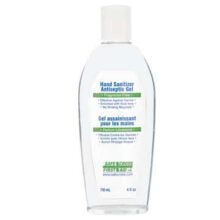Antiseptic Hand Sanitizer Gel
Login For Health Care Pricing
Typically Ships in 3-5 Business Days
This is a 118 mL bottle of antiseptic hand sanitizer gel that will help you keep your hands clean without using soap and water.
Infection control is a critical aspect of maintaining a safe and healthy environment within healthcare clinics. It plays a crucial role in preventing the spread of infectious diseases, protecting both patients and healthcare providers.
Effective infection control practices minimize the risk of healthcare-associated infections (HAIs), promote patient safety, and contribute to the overall quality of care. This article highlights the importance of infection control in a healthcare clinic and emphasizes its significance in maintaining a safe healthcare environment.
Infection control is a priority within the environment of a healthcare clinic for the following reasons:
Infection control measures, such as hand hygiene, proper cleaning and disinfection of medical equipment, and adherence to standard precautions, help prevent the transmission of pathogens between patients. This is especially important for vulnerable individuals, including those with compromised immune systems or chronic illnesses.
Infection control measures not only protect patients but also safeguard healthcare providers from exposure to infectious agents. By implementing appropriate precautions, providing personal protective equipment (PPE), and offering necessary vaccinations, healthcare workers can reduce their risk of acquiring infections while caring for patients.
HAIs are infections acquired during the course of receiving healthcare. Infection control practices, such as proper sterilization of instruments, adherence to aseptic techniques during procedures, and maintenance of a clean environment, significantly reduce the occurrence of HAIs, leading to improved patient outcomes and reduced healthcare costs.
Infection control practices also play an important role in maintaining patient trust. This in turn is important for a number of reasons:
Infection control measures demonstrate a commitment to patient safety and well-being. Patients trust healthcare providers who prioritize infection control, leading to enhanced confidence in the care they receive.
Healthcare clinics that prioritize infection control build a reputation for providing high-quality care. Patients are more likely to choose healthcare facilities that prioritize patient safety and infection prevention.
Patients who receive care in a clean and infection-controlled environment are more likely to have positive experiences, leading to higher levels of patient satisfaction.
By implementing effective infection control measures, healthcare clinics contribute to limiting the transmission of infectious diseases within the community. This is particularly crucial during disease outbreaks or pandemics.
Healthcare clinics play a vital role in public health efforts by adhering to infection control guidelines, reporting communicable diseases, and collaborating with public health authorities in disease surveillance and prevention.
Infection control practices in healthcare clinics also contribute to emergency preparedness, ensuring that clinics are equipped to handle infectious disease outbreaks or other public health emergencies effectively.
Regular handwashing with soap and water or the use of alcohol-based hand sanitizers is one of the most effective ways to prevent the spread of infections.
Proper cleaning, disinfection, and sterilization of medical instruments and equipment are crucial to prevent cross-contamination.
Healthcare providers should use appropriate PPE, such as gloves, masks, gowns, and eye protection, based on the nature of patient interaction and potential exposure to infectious agents.
Regular and thorough cleaning of healthcare facilities, including surfaces, patient rooms, and equipment, helps maintain a clean and safe environment.
Healthcare providers should receive ongoing education and training on infection control practices, including the latest guidelines and protocols, to ensure adherence to best practices.
Infection control in a healthcare clinic is of paramount importance in maintaining a safe and healthy environment for patients, healthcare providers, and the community.
By implementing effective infection control measures, healthcare clinics can prevent the spread of infections, protect patients and staff, maintain patient trust, and contribute to public health efforts.
A strong commitment to infection control not only improves patient outcomes but also establishes the clinic’s reputation as a reliable and safe healthcare provider.
Continuous education, training, and adherence to best practices are essential for successful infection control programs in healthcare settings, ensuring the highest standards of care and patient safety.

Login For Health Care Pricing
Typically Ships in 3-5 Business Days
This is a 118 mL bottle of antiseptic hand sanitizer gel that will help you keep your hands clean without using soap and water.

Login For Health Care Pricing
In Stock
Yellow disposable isolation gowns sold in a bag of 10. Each weighs 24g and is equipped with elastic wrist and side ties.

Login For Health Care Pricing
In Stock
Disposable pillow cases are invaluable in infection control and help to prolong pillow life by protecting the pillow from stains and spills.

Login For Health Care Pricing
In Stock
IsaGel No Rinse Hand Cleanser is an instant hand sanitizing gel used for hand washing to decrease the presence of bacteria on the skin. Also contains added moisturizers to prevent dryness on hands.

Login For Health Care Pricing
In Stock
Stanhexadine Cleanser is intended for treating superficial skin infections.

Login For Health Care Pricing
Typically Ships in 3-5 Business Days
3 Compartment Sterile Dressing Tray. Includes metal & plastic forceps, field towel, absorbent towel, cotton balls, non woven gauze sponges and waste bag for convenient disposal.